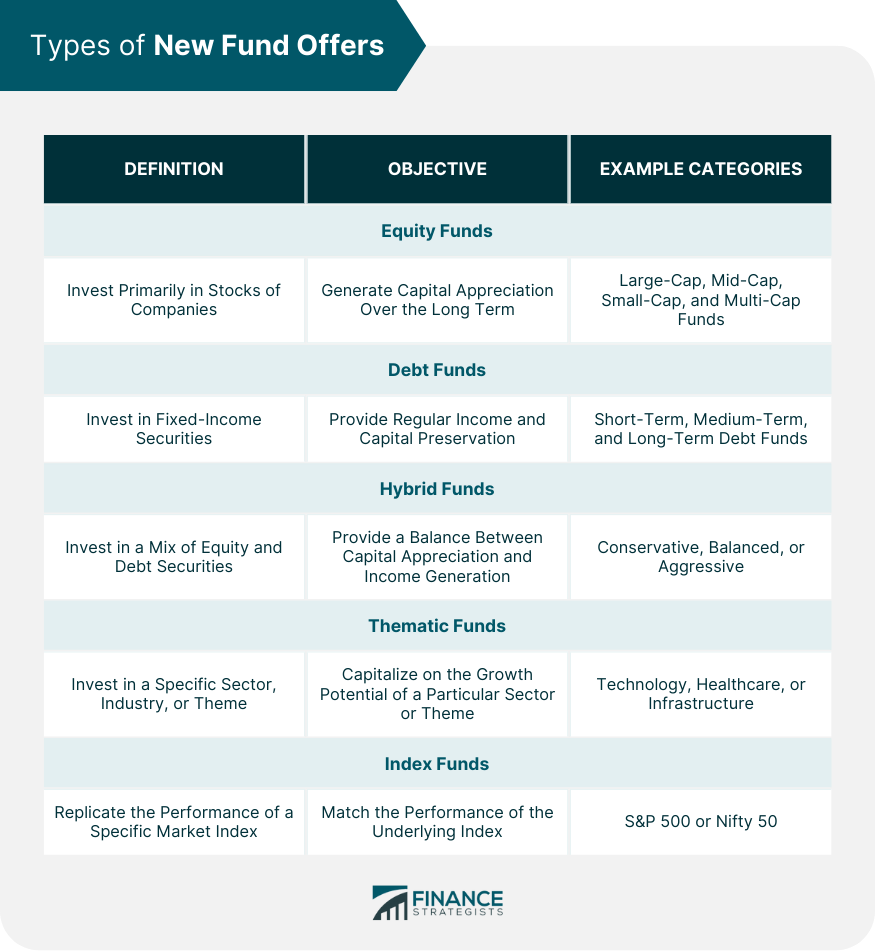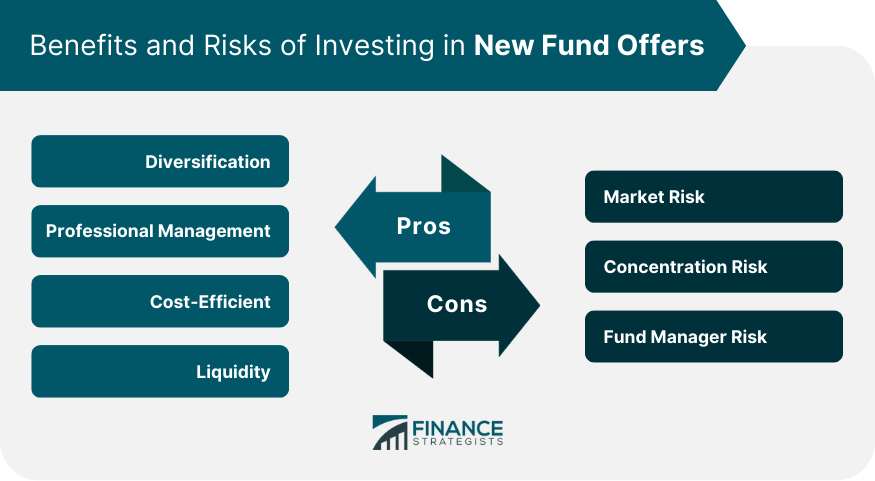New Fund Offer is a term used in the financial world to refer to the initial offering of shares or units in a mutual fund or exchange-traded fund (ETF) scheme. This is the first time that investors can purchase these units, typically at a nominal price. The purpose of launching NFOs is to raise capital for the fund and attract investors with new investment opportunities. Key players involved in NFOs include asset management companies, investment advisors, and distributors. Equity funds are NFOs that invest primarily in stocks of companies. The objective of these funds is to generate capital appreciation over the long term. Equity funds can be further classified into various categories, such as large-cap, mid-cap, small-cap, and multi-cap funds, depending on the market capitalization of the companies they invest in. Debt funds are NFOs that invest in fixed-income securities, such as government bonds, corporate bonds, and money market instruments. The primary objective of debt funds is to provide regular income and capital preservation. These funds can be categorized based on the duration of the underlying securities, such as short-term, medium-term, and long-term debt funds. Hybrid funds are NFOs that invest in a mix of equity and debt securities. These funds aim to provide a balance between capital appreciation and income generation. Depending on the proportion of equity and debt in the portfolio, hybrid funds can be classified as conservative, balanced, or aggressive. Thematic funds are NFOs that invest in a specific sector, industry, or theme. The objective of these funds is to capitalize on the growth potential of a particular sector or theme, such as technology, healthcare, or infrastructure. Thematic investing can offer higher returns than diversified funds, but they also carry higher risks due to their concentrated investment approach. Index funds are NFOs that replicate the performance of a specific market index, such as the S&P 500 or the Nifty 50. These funds invest in the same securities and in the same proportion as the underlying index, aiming to match its performance. Index funds are passively managed and typically have lower fees than actively managed funds. NFOs are usually offered at a nominal price, typically 10 units of the local currency. This initial price allows investors to enter the fund at an affordable cost, making it more attractive to a larger pool of investors. The offer period is the time frame during which investors can subscribe to the NFO. This period usually lasts for a few weeks, and once it ends, the subscription window closes. After the offer period, the fund starts operating, and investors can buy or sell the units at the prevailing market price. NFOs often have a minimum investment requirement to ensure that investors are committed to the fund. This amount varies from one fund to another and can range from a few hundred to several thousand units of the local currency. The investment objective of an NFO defines the fund's primary goal, such as capital appreciation, income generation, or a combination of both. Understanding the investment objective can help investors determine if the NFO aligns with their financial goals. The portfolio composition of an NFO refers to the allocation of assets within the fund, such as stocks, bonds, or cash. This composition determines the fund's risk-return profile and plays a crucial role in meeting the investment objective. The fund manager is responsible for managing the NFO's portfolio, making investment decisions, and ensuring that the fund achieves its objectives. The fund manager's experience, expertise, and past performance play a significant role in the success of the NFO. Investors should research the fund manager's track record and management style before investing in an NFO. The expense ratio represents the annual costs associated with managing the fund, such as management fees, operating expenses, and distribution costs. A lower expense ratio is generally more attractive to investors, as it indicates that a higher proportion of the fund's returns will be passed on to investors. NFOs can provide investors with exposure to a diverse range of asset classes, sectors, and investment strategies, helping to reduce portfolio risk and enhance returns. NFOs are managed by experienced fund managers who possess the necessary skills and resources to identify and capitalize on investment opportunities in the market. Investing in NFOs can be cost-effective, as the initial price is usually set at a nominal value, allowing investors to enter the fund at a lower cost. Additionally, passively managed NFOs, such as index funds, tend to have lower expense ratios compared to their actively managed counterparts. NFOs offer investors the flexibility to buy and sell units at the prevailing market price, providing a high degree of liquidity. Investing in NFOs exposes investors to market risk, which is the potential for losses due to fluctuations in the value of the underlying assets. NFOs that invest in a specific sector or theme may carry higher concentration risk compared to diversified funds, as they are more vulnerable to changes affecting that particular sector or theme. The performance of an NFO is heavily influenced by the decisions made by the fund manager. A change in the fund manager or poor decision-making can negatively impact the fund's returns. New Fund Offers present investors with a unique opportunity to invest in a diverse range of asset classes, sectors, and investment strategies. These funds offer the benefits of professional management, cost efficiency, and liquidity. However, it is crucial for investors to be aware of the risks associated with NFOs, such as market risk, concentration risk, and fund manager risk. Proper due diligence and research are essential in understanding these aspects and making informed investment decisions. Before investing in an NFO, investors should thoroughly analyze the fund's features, including its investment objective, portfolio composition, and fund manager's track record. By considering these aspects, investors can choose NFOs that align with their financial goals and risk tolerance. In doing so, they can potentially enhance their portfolio returns while minimizing potential risks.What Is a New Fund Offer (NFO)?
Types of New Fund Offers
Equity Funds
Debt Funds
Hybrid Funds
Thematic Funds
Index Funds

Features of New Fund Offers
NFO Price
Offer Period
Minimum Investment
Investment Objective
Portfolio Composition
Fund Manager
Expense Ratio
Benefits of Investing in New Fund Offers
Diversification
Professional Management
Cost-Efficient
Liquidity
Risks Associated With New Fund Offers
Market Risk
Concentration Risk
Fund Manager Risk

Conclusion
New Fund Offer (NFO) FAQs
A new fund offer is the first-time sale of a mutual fund's units to the public. An NFO is a way for a mutual fund company to raise money from investors to start a new fund or to add a new scheme to an existing fund.
An NFO typically lasts for a limited period, usually between 15 to 30 days. During this period, investors can subscribe to the new fund offer by purchasing the units of the scheme.
Investing in an NFO can offer several benefits, such as the potential to earn higher returns as the fund is new and may have a different investment strategy. Additionally, the expense ratio of an NFO is usually lower compared to an established mutual fund. Moreover, investing in an NFO can provide an opportunity to get in on the ground floor of a new fund.
Investing in an NFO comes with some risks, such as the lack of a track record for the fund or the management team. Additionally, the new fund may have a different investment strategy than the investor's current portfolio, which can lead to an imbalance in their asset allocation.
Individuals can invest in an NFO by subscribing to the units of the scheme during the offering period. Investors can typically invest in an NFO through the fund house's website, authorized distributors, or through their brokers. The minimum investment amount for an NFO varies from fund to fund.
True Tamplin is a published author, public speaker, CEO of UpDigital, and founder of Finance Strategists.
True is a Certified Educator in Personal Finance (CEPF®), author of The Handy Financial Ratios Guide, a member of the Society for Advancing Business Editing and Writing, contributes to his financial education site, Finance Strategists, and has spoken to various financial communities such as the CFA Institute, as well as university students like his Alma mater, Biola University, where he received a bachelor of science in business and data analytics.
To learn more about True, visit his personal website or view his author profiles on Amazon, Nasdaq and Forbes.











